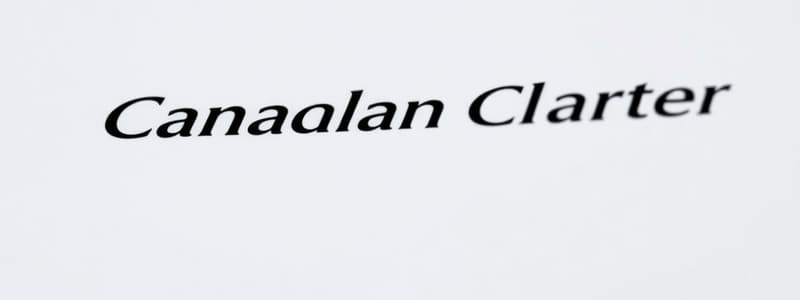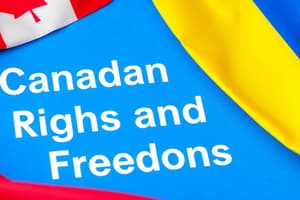Podcast
Questions and Answers
What is the purpose of the Canadian Charter of Rights and Freedoms?
What is the purpose of the Canadian Charter of Rights and Freedoms?
To protect the essential rights and freedoms of people living in Canada.
Which of the following is NOT a key feature of democracy?
Which of the following is NOT a key feature of democracy?
- Regular elections
- Fair and equal treatment under the law
- Citizen participation in decision-making
- Rule by a single individual or a small group (correct)
The Canadian Charter of Rights and Freedoms guarantees the right to vote in all elections.
The Canadian Charter of Rights and Freedoms guarantees the right to vote in all elections.
False (B)
What are the two official languages of Canada?
What are the two official languages of Canada?
What does the term 'accommodating' mean in the context of equality rights?
What does the term 'accommodating' mean in the context of equality rights?
What document established the rights of individuals in England long ago?
What document established the rights of individuals in England long ago?
Which of the following is NOT a key principle of the Rule of Law?
Which of the following is NOT a key principle of the Rule of Law?
What is the difference between 'equality' and 'equity'?
What is the difference between 'equality' and 'equity'?
Flashcards
Canadian Charter of Rights and Freedoms
Canadian Charter of Rights and Freedoms
A document protecting essential rights and freedoms in Canada.
Equality Rights
Equality Rights
Treating all people the same, regardless of gender, race, or religion
Accommodating
Accommodating
Treating people and groups with special needs fairly and equally.
Aboriginal Rights
Aboriginal Rights
Signup and view all the flashcards
Language Rights
Language Rights
Signup and view all the flashcards
Democracy
Democracy
Signup and view all the flashcards
Common Good
Common Good
Signup and view all the flashcards
Equity
Equity
Signup and view all the flashcards
Discrimination
Discrimination
Signup and view all the flashcards
Individual Rights
Individual Rights
Signup and view all the flashcards
Collective Rights
Collective Rights
Signup and view all the flashcards
Rule of Law
Rule of Law
Signup and view all the flashcards
Magna Carta
Magna Carta
Signup and view all the flashcards
Suffrage
Suffrage
Signup and view all the flashcards
Suffragettes
Suffragettes
Signup and view all the flashcards
Representative democracy
Representative democracy
Signup and view all the flashcards
Participation and Voting
Participation and Voting
Signup and view all the flashcards
Official Language
Official Language
Signup and view all the flashcards
Bias
Bias
Signup and view all the flashcards
Challenge
Challenge
Signup and view all the flashcards
Winning the right to Vote
Winning the right to Vote
Signup and view all the flashcards
Detecting Bias
Detecting Bias
Signup and view all the flashcards
Charter of Rights and Freedoms
Charter of Rights and Freedoms
Signup and view all the flashcards
Study Notes
Justine's Case and Discrimination
- Justine, a hockey player, challenged an Ontario law that discriminated against her due to gender.
- The case went to the Supreme Court, where she won.
- The court ruled that gender-based discrimination is illegal.
Canadian Charter of Rights and Freedoms
- The Canadian Charter of Rights and Freedoms protects the rights and freedoms of Canadians.
Individual Rights
- Equality Rights: Everyone deserves equal treatment, regardless of gender, race, or religion.
- Accommodating Differences: People with special needs should be treated equally.
Collective Rights
- Aboriginal Rights: Aboriginal people have rights to their traditional territories even if no treaty exists.
- Language Rights: Both English and French have equal status and rights within Canada.
Becoming a Canadian Citizen
- Requirements include birth in Canada or successful completion of a citizenship test.
Democracy and Participation
- Democracy: A system where citizens participate in shaping their communities. Increased participation strengthens democracy.
- Common Good: A condition that benefits the majority of people.
- Equity: Treating people fairly, ensuring everyone has opportunities to succeed.
- Laws Enforcing Equity: Laws are meant to guarantee equitable outcomes for all.
Democratic Rights (Canadian Charter)
- The Charter includes sections detailing citizens' democratic rights.
Participation and Voting
- Representative Democracy: Canadian citizens elect representatives to govern on their behalf. Representatives must address citizen needs.
- Voting Rights in Canada's Past: Initially, voting rights were limited to men from Europe who owned property. Over time, more people gained the right to vote.
- Timeline and Voting Age: The rules for voting and eligibility have changed over time— the age and eligibility details are not included in the text and should be viewed on page 41.
Voting Rights and Women
- Suffrage: The right to vote.
- Suffragettes: Women who fought for women's suffrage.
- Women gained the right to vote in 1918.
- Other groups like people of different religions, backgrounds, or nationalities later gained full voting rights.
Rule of Law in Democracy
- Rule of Law: A crucial component of democracy, stating that laws apply equally to all.
- Magna Carta: An influential document (1215) establishing the rule of law in England. It signified that even important individuals must abide by the law of the land.
Making the Law (Rule of Law)
- Citizen Participation: Citizens must have input in creating and changing laws.
- Law Information: Citizens must be informed about existing laws.
- Equal Treatment under the Law: Laws apply equally to everyone regardless of factors like race, origin, religion, gender, or disability.
- Applying the Law: citizens must also participate in applying laws fairly.
How People Make a Difference
- Individuals can affect change by supporting causes like community building projects, helping marginalized groups, or sharing their stories.
Detecting Bias
- Bias: Prejudice favoring or opposing something, often unfairly affecting judgment.
- Example of Bias Detection: Finding bias in written materials involves identifying words or phrases that express prejudice.
Studying That Suits You
Use AI to generate personalized quizzes and flashcards to suit your learning preferences.




